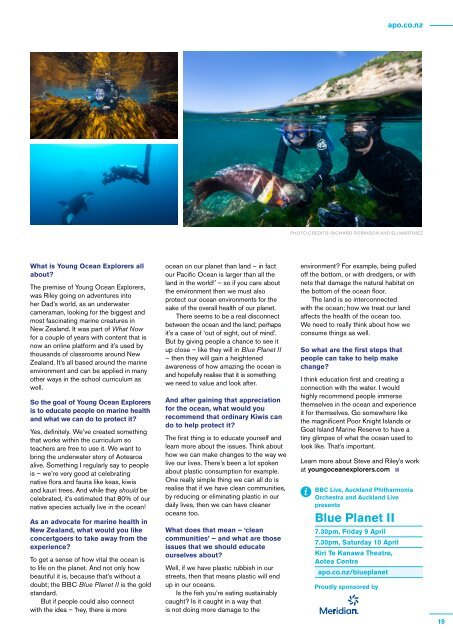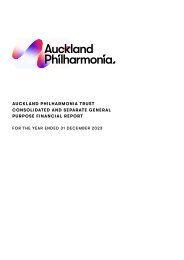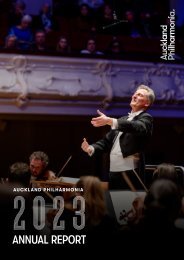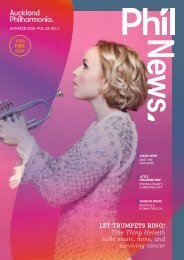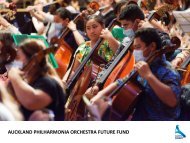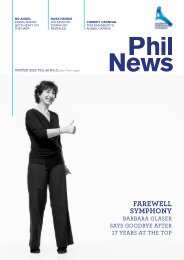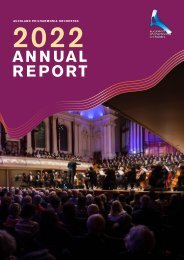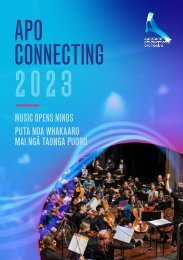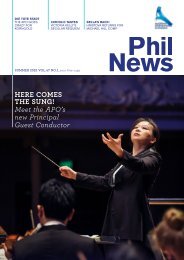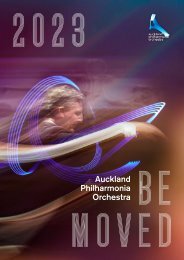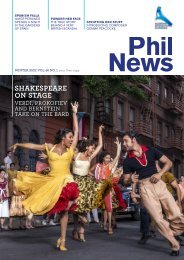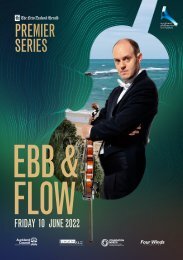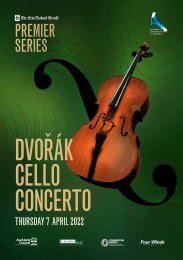APO Phil News Summer 2021
- No tags were found...
You also want an ePaper? Increase the reach of your titles
YUMPU automatically turns print PDFs into web optimized ePapers that Google loves.
apo.co.nz<br />
PHOTO CREDITS: RICHARD ROBINSON AND ELI MARTINEZ<br />
What is Young Ocean Explorers all<br />
about?<br />
The premise of Young Ocean Explorers,<br />
was Riley going on adventures into<br />
her Dad’s world, as an underwater<br />
cameraman, looking for the biggest and<br />
most fascinating marine creatures in<br />
New Zealand. It was part of What Now<br />
for a couple of years with content that is<br />
now an online platform and it’s used by<br />
thousands of classrooms around New<br />
Zealand. It’s all based around the marine<br />
environment and can be applied in many<br />
other ways in the school curriculum as<br />
well.<br />
So the goal of Young Ocean Explorers<br />
is to educate people on marine health<br />
and what we can do to protect it?<br />
Yes, definitely. We’ve created something<br />
that works within the curriculum so<br />
teachers are free to use it. We want to<br />
bring the underwater story of Aotearoa<br />
alive. Something I regularly say to people<br />
is – we’re very good at celebrating<br />
native flora and fauna like keas, kiwis<br />
and kauri trees. And while they should be<br />
celebrated, it’s estimated that 80% of our<br />
native species actually live in the ocean!<br />
As an advocate for marine health in<br />
New Zealand, what would you like<br />
concertgoers to take away from the<br />
experience?<br />
To get a sense of how vital the ocean is<br />
to life on the planet. And not only how<br />
beautiful it is, because that’s without a<br />
doubt; the BBC Blue Planet II is the gold<br />
standard.<br />
But if people could also connect<br />
with the idea – ‘hey, there is more<br />
ocean on our planet than land – in fact<br />
our Pacific Ocean is larger than all the<br />
land in the world!’ – so if you care about<br />
the environment then we must also<br />
protect our ocean environments for the<br />
sake of the overall health of our planet.<br />
There seems to be a real disconnect<br />
between the ocean and the land; perhaps<br />
it’s a case of ‘out of sight, out of mind’.<br />
But by giving people a chance to see it<br />
up close – like they will in Blue Planet II<br />
– then they will gain a heightened<br />
awareness of how amazing the ocean is<br />
and hopefully realise that it is something<br />
we need to value and look after.<br />
And after gaining that appreciation<br />
for the ocean, what would you<br />
recommend that ordinary Kiwis can<br />
do to help protect it?<br />
The first thing is to educate yourself and<br />
learn more about the issues. Think about<br />
how we can make changes to the way we<br />
live our lives. There’s been a lot spoken<br />
about plastic consumption for example.<br />
One really simple thing we can all do is<br />
realise that if we have clean communities,<br />
by reducing or eliminating plastic in our<br />
daily lives, then we can have cleaner<br />
oceans too.<br />
What does that mean – ‘clean<br />
communities’ – and what are those<br />
issues that we should educate<br />
ourselves about?<br />
Well, if we have plastic rubbish in our<br />
streets, then that means plastic will end<br />
up in our oceans.<br />
Is the fish you’re eating sustainably<br />
caught? Is it caught in a way that<br />
is not doing more damage to the<br />
environment? For example, being pulled<br />
off the bottom, or with dredgers, or with<br />
nets that damage the natural habitat on<br />
the bottom of the ocean floor.<br />
The land is so interconnected<br />
with the ocean; how we treat our land<br />
affects the health of the ocean too.<br />
We need to really think about how we<br />
consume things as well.<br />
So what are the first steps that<br />
people can take to help make<br />
change?<br />
I think education first and creating a<br />
connection with the water. I would<br />
highly recommend people immerse<br />
themselves in the ocean and experience<br />
it for themselves. Go somewhere like<br />
the magnificent Poor Knight Islands or<br />
Goat Island Marine Reserve to have a<br />
tiny glimpse of what the ocean used to<br />
look like. That’s important.<br />
Learn more about Steve and Riley’s work<br />
at youngoceanexplorers.com<br />
BBC Live, Auckland <strong>Phil</strong>harmonia<br />
Orchestra and Auckland Live<br />
presents<br />
Blue Planet II<br />
7.30pm, Friday 9 April<br />
7.30pm, Saturday 10 April<br />
Kiri Te Kanawa Theatre,<br />
Aotea Centre<br />
apo.co.nz/blueplanet<br />
Proudly sponsored by<br />
19


